Save $40 on your initial consult with a TNI Dietitian!
Talk to a real Dietitian for only $99: Schedule Now
This post contains links through which we may earn a small commission should you make a purchase from a brand. This in no way affects our ability to objectively critique the products and brands we review.
Evidence Based Research To fulfill our commitment to bringing our audience accurate and insightful content, our expert writers and medical reviewers rely on carefully curated research.
Read Our Editorial Policy
Greek yogurt is a notoriously high protein meal or snack, with double the amount of the muscle-building macronutrient as regular yogurt.
But which brands are the best Greek yogurts for protein that takes the cake? If you’ve ever been confused in the ever-expanding yogurt aisle, here are nine healthy, high-protein yogurts to look out for, from highest to lowest.
A few notes: A typical single-serve yogurt container is 5.3 ounces (⅔ of a cup), but not all brands use these sizes. Therefore, we sometimes had to do some math to calculate how much protein was in a ⅔ cup serving, which is what you’ll see in the parentheses.
Get a science-backed calorie & macro plan, built for your life.
Get a science-backed calorie & macro plan, built for your life.

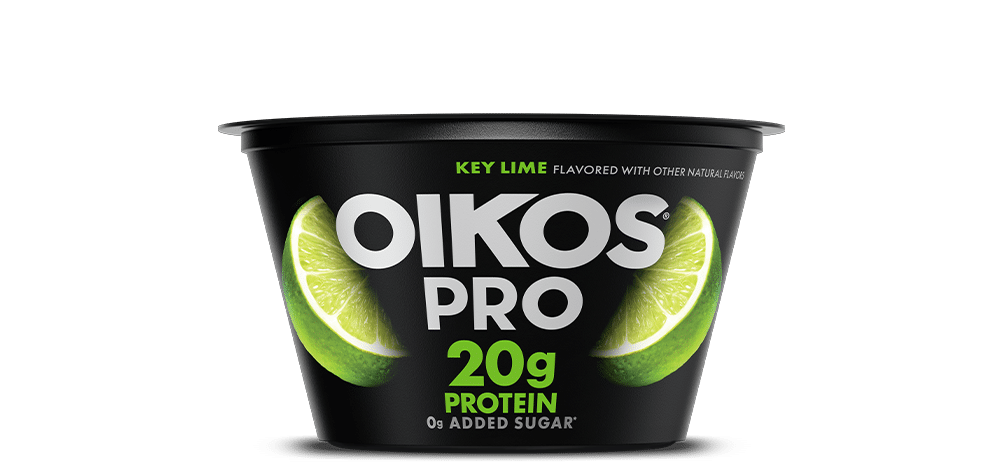
At a whopping 20 grams of protein per container, Oikos Pro tops the list of high-protein Greek yogurts. It does this by adding whey protein concentrate, which combines with the cultured non-fat milk to reach 20 grams.
Oikos also does not contain added sugar; instead, it uses stevia and natural flavors. For coloring, it uses fruit and vegetable juice instead of artificial dyes.If you want an unflavored option, look for Plain Oikos PRO High Protein, which has 25 grams per 6 ounces.
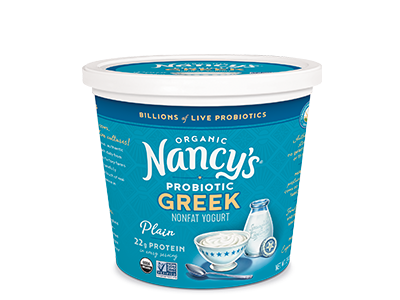
Nancy’s is one of our favorite yogurt and kefir brands, with their organic offerings from pasture-raised cows in Oregon.
Nancy’s Organic Non-Fat Probiotic Greek Yogurt is one of the highest protein yogurts we’ve come across, with 22 grams per 6 ounces (19.4g per 5.3oz). The whole milk version has a bit less protein, at 17.6g per serving.
The only ingredients are organic pasteurized non-fat milk and live yogurt cultures. They also add 11 additional probiotic strains, making it one of the most probiotic-diverse yogurts, as well.
Plus, Nancy’s products are USDA Organic Certified and Non-GMO Project Verified.
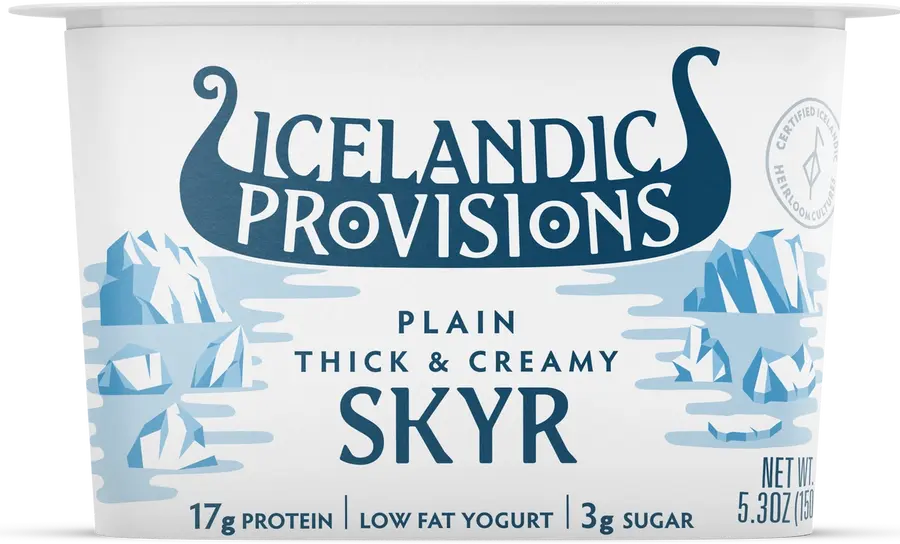
Okay, so this isn’t technically “Greek yogurt,” but it’s very similar. Skyr is an Icelandic form of strained yogurt that looks and tastes a lot like Greek yogurt (read more about their similarities and differences here!).
Skyr is slightly higher in protein compared to Greek yogurt because it undergoes an additional straining process, which further concentrates the protein.
We love Icelandic Provisions Plain Skyr for its whopping 17 grams of protein and mild and creamy texture, which is less tangy than Greek yogurt because it uses different bacterial strains that are less sour.
Keep in mind that their flavored skyr varieties contain less protein (15 grams per serving).
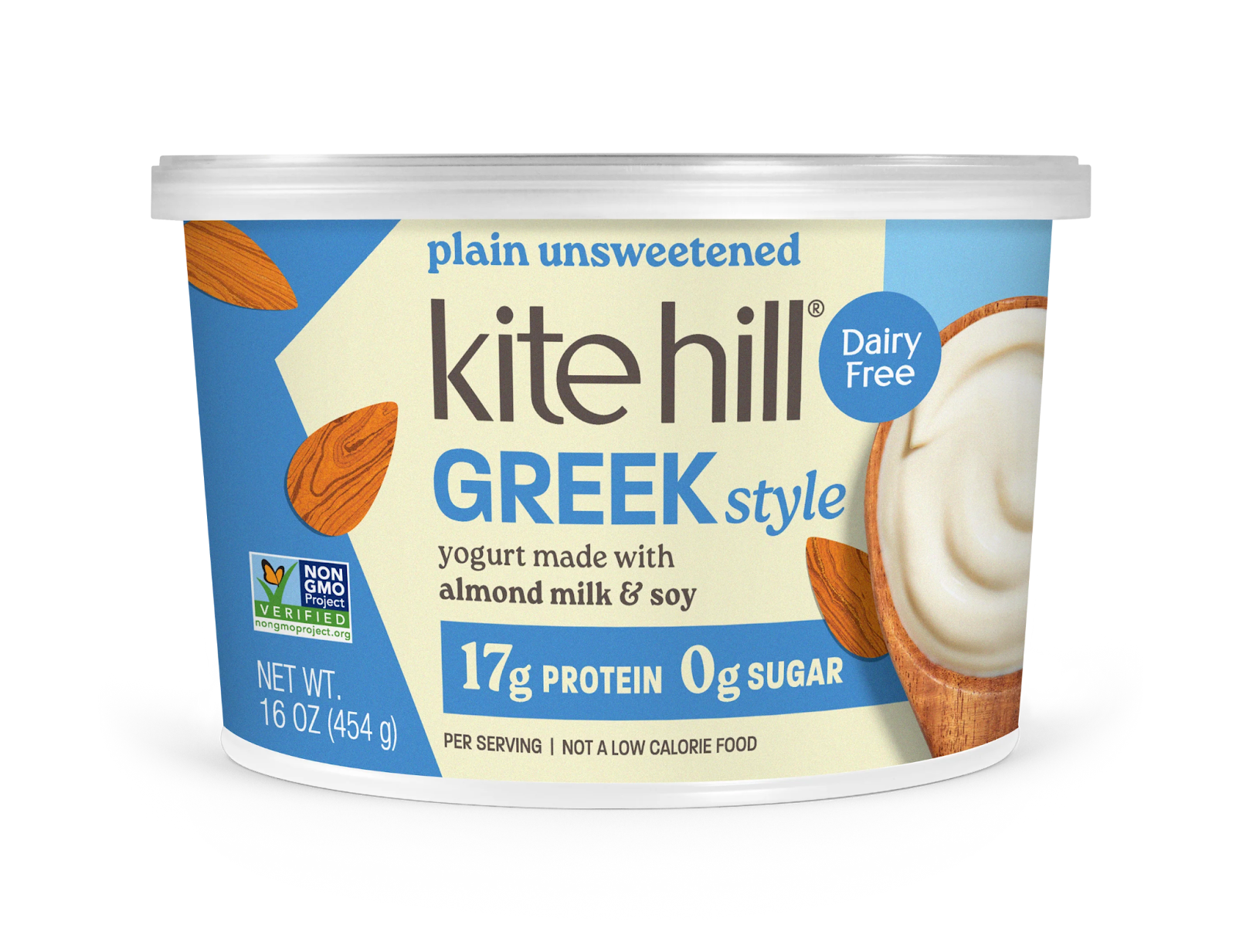
For all of our dairy-free friends, you no longer have to settle for watery, protein-lacking vegan yogurt.
Kite Hill Greek-Style Plant-Based Yogurt is the highest-protein yogurt without dairy that we have seen, with a whopping 17 grams per 5.3oz. It uses a combination of soy protein isolate, almond milk, and tapioca starch to mimic yogurt, providing a thick and creamy texture without any of the dairy—plus, it still has probiotics!
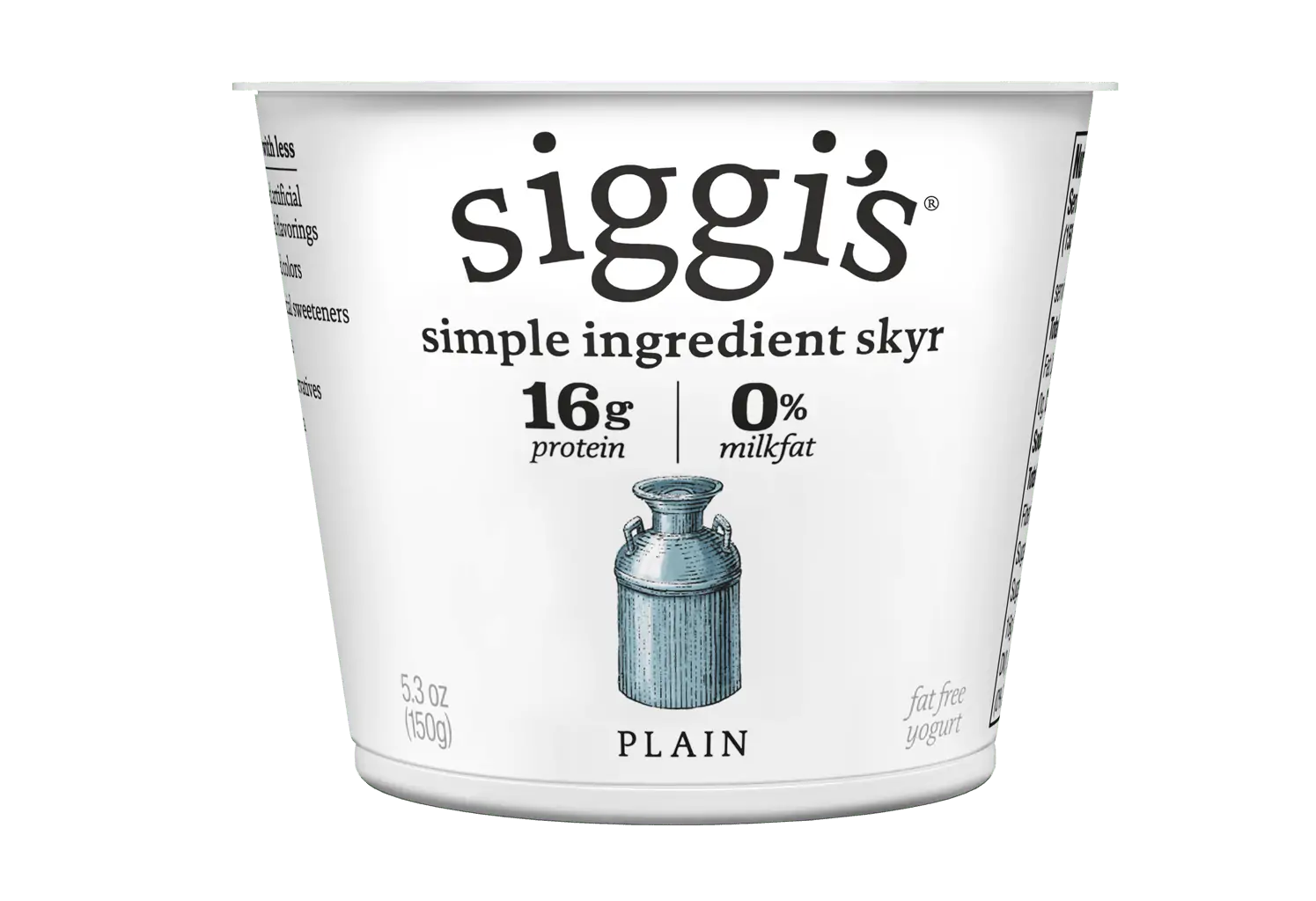
Siggi’s is another popular brand of Icelandic skyr, created by Siggi Hilmarsson way back in 2005.
The ingredients could not be simpler (just cultured pasteurized skim milk and live, active cultures) in their plain, unsweetened variety, providing 16 grams of protein per serving.
Siggi’s also has flavored yogurts, drinkable yogurts, and yogurt pouches (a la Gogurt), but the plain 0% skyr is the highest in protein.
While their plain protein yogurt has less sugar, Siggi’s vanilla flavor is one of the tastier Greek-style yogurts out there!
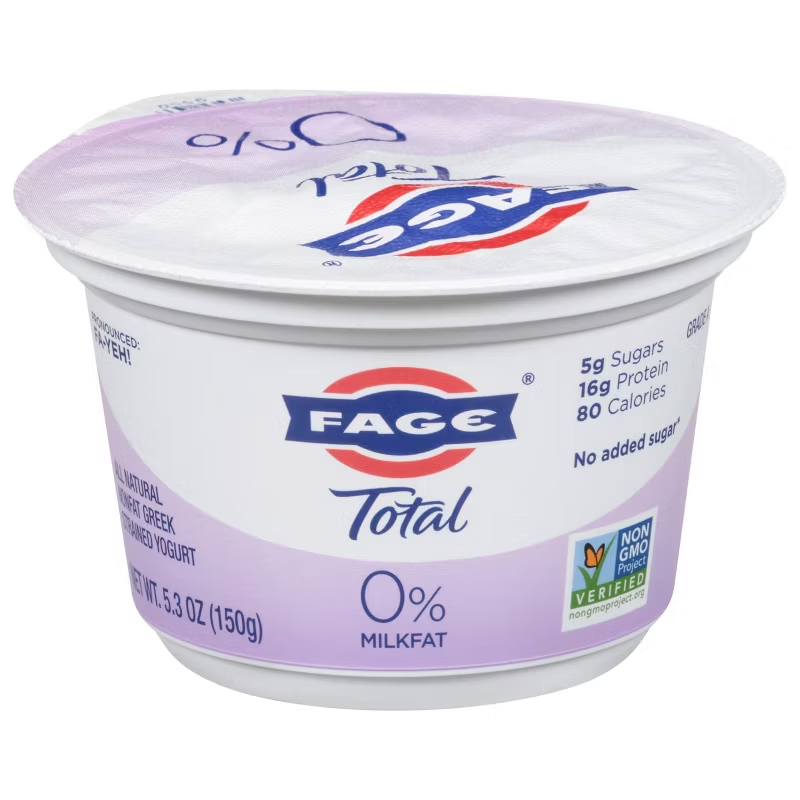
This plain Greek yogurt—Fage Total 0%—contains 16 grams per 5.3 ounces. Non-fat Greek yogurt has a smidge more protein than higher-fat varieties, which is why we chose the 0% fat option here.
However, if you want a bit more calories and satiety at the risk of losing 1-2 grams of protein, choose the Fage Total 2% or 5% options.
We like Fage for its thick and creamy texture and natural ingredients—just cultured milk and live and active cultures. They also add a few extra probiotic bacteria to benefit your gut, including L. Acidophilus, Bifidobacterium, and L. Casei.
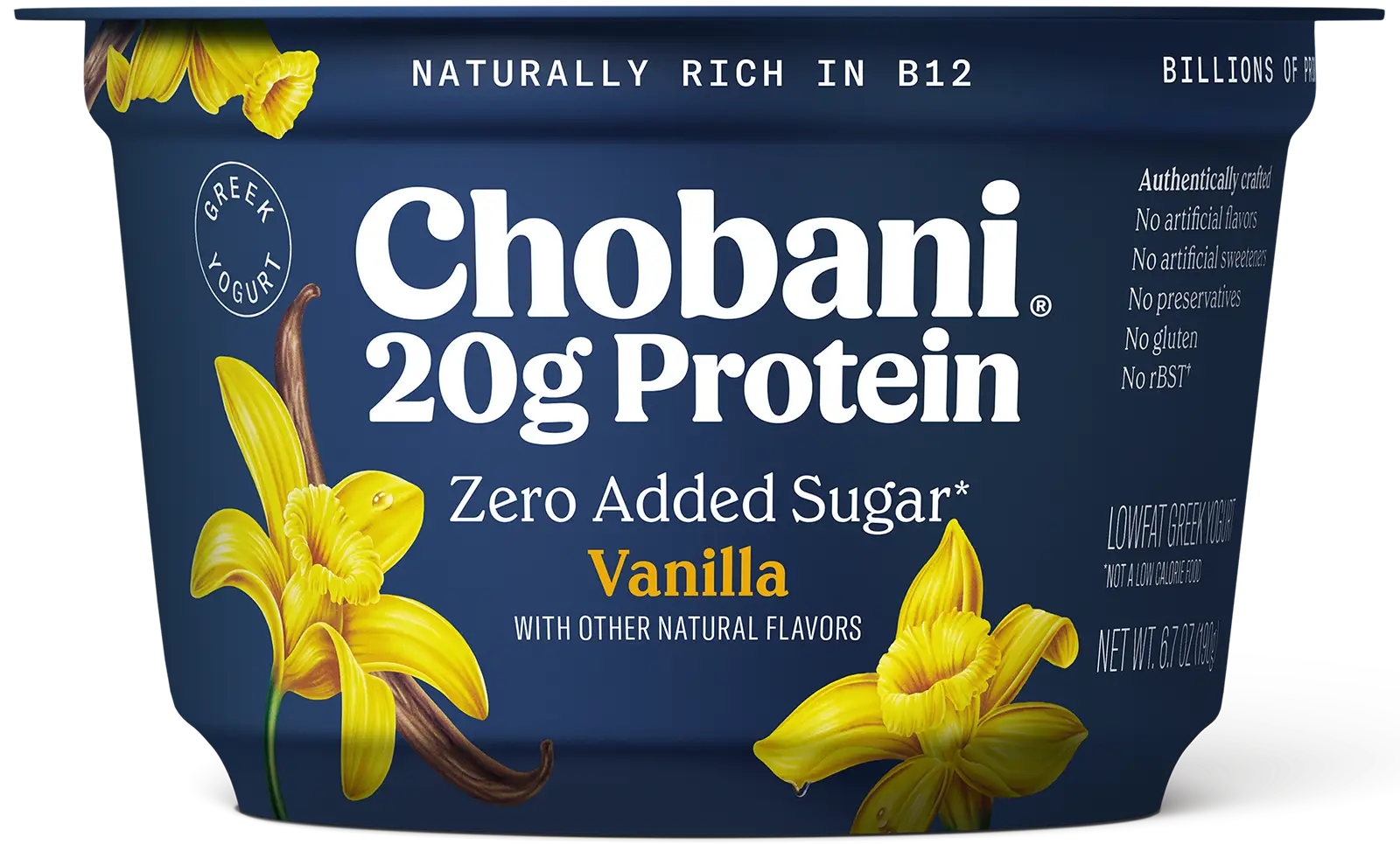
Chobani High Protein Greek Yogurt tricks us here a little bit as they increased the single-serve container from 5.3oz to 6.7oz, which obviously boosts the total protein.
However, even after calculating the difference, the math still maths—Chobani High Protein is, in fact, one of the higher-protein Greek yogurts.
Per ⅔ cup serving size, this Chobani Greek yogurt contains 15.8 grams of protein—plus, even the flavored options are zero sugar, thanks to stevia leaf extract.
This Chobani variety also includes lactase—the enzyme we need to break down lactose milk sugar—so people who are lactose intolerant will probably not have major symptoms when eating it.
One downside is that Chobani High Protein does not include an unsweetened variety, which many people prefer. If that’s you, opt for the Chobani Greek Non-Fat Plain, which still offers 14 grams of protein per serving.

Another Oikos option is the Oikos Triple Zero, which has 15 grams of protein per 5.3oz container—in addition to zero added sugar, zero artificial sweeteners, and zero fat.
Oikos also fortifies their yogurts with vitamin D, providing 10% of your daily needs per serving.
Once again, there is no unsweetened option in the single-serve containers, so look for Plain Oikos Triple Zero for an unflavored high-protein yogurt, which has 18g of protein per 6 ounces.

Last but not least, another excellent Greek yogurt choice is Ellenos Plain, providing 15 grams of protein per 5.3-ounce serving. It’s also a full-fat yogurt, providing additional satiety and appetite control.
Ellenos is a family-run dairy company based in Seattle that produces incredibly creamy and delicious yogurts with recipes derived from the Apostolopoulos family in Greece (as they put it, “it’s better than ice cream”!).
While their plain yogurt is the highest in protein, we’d also recommend checking out their flavored versions if you want a sweet treat, as Ellenos makes all of their fruit purees in-house (with unique flavors like marionberry, passion fruit, pink guava, and fresh lemon curd).
Greek yogurt has more protein than eggs, both ounce for ounce and considering typical serving sizes. A typical serving size of Greek yogurt is 5–6 ounces, providing 12-20g of protein. It’s common to eat 1–2 eggs at a time, and each large contains 6g of protein. That said, if you usually eat 3 eggs, that could exceed the protein content of most Greek yogurts.
Yes, it’s okay to eat Greek yogurt every day if you tolerate it! Greek yogurt is a very healthy dairy choice, supporting gut health, immunity, bone density, weight management, and cardiometabolic health.
Greek yogurt contains both carbohydrates and proteins, but it is predominantly a protein. Greek yogurt typically contains 12-18g of protein and 7-9g of natural carbohydrates from milk sugar (lactose) per 5-oz serving. Greek yogurt has fewer carbohydrates than regular yogurt because some of the lactose gets removed during the straining process. Non-fat Greek yogurt has more carbs than full-fat Greek yogurt. But overall, Greek yogurt is considered a protein food.
Greek protein-rich yogurts include Oikos Pro, Nancy’s Organic Non-Fat Greek Yogurt, Fage Total 0%, Chobani High Protein, Oikos Triple Zero, and Ellenos Plain Unsweetened. Yogurts that are similar to Greek yogurt and high in protein include Icelandic Provisions Skyr, Siggi’s Icelandic Yogurt, and Kite Hill Greek-Style Yogurt (dairy-free). All of these high-protein yogurts have 15 grams of protein or more per serving (5.3oz).